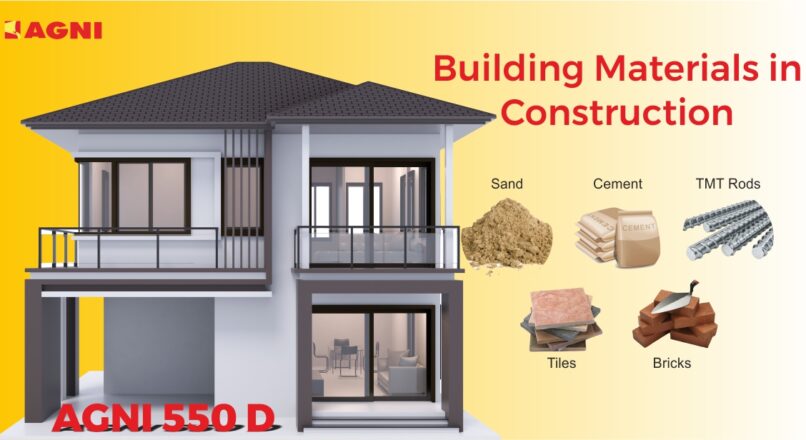
Exploring the Top 10 Building Materials Used in Modern Construction
Choosing building materials is crucial to ensuring the structure’s strength, durability, and longevity when embarking on a construction project. The materials used in construction are broadly classified into natural and manmade categories, each offering unique properties suited to different aspects of the building. This guide provides an overview of the most commonly used materials in construction, shedding light on their properties, uses, and benefits.
- Steel: The Backbone of Modern Construction
Steel is a cornerstone in the construction world, known for its strength, durability, and versatility. Composed primarily of iron and carbon, steel can be further enhanced with materials like chromium to produce stainless steel, which resists corrosion and oxidation. Despite its weight, steel remains a top choice for constructing skyscrapers, bridges, and large industrial facilities due to its unmatched strength and ability to withstand various environmental conditions.
- Cement: The Binding Agent
Cement is a fundamental building material that acts as a binding agent, holding other materials together. It is rarely used alone; instead, it is mixed with sand and gravel to form concrete or with fine sand to create mortar for bricklaying. The ability of cement to solidify and bond materials makes it a crucial component in ensuring the structural integrity and durability of buildings.
- Concrete: The Versatile Building Block
Concrete is a composite material formed by mixing aggregates (like gravel and crushed stone) with cement and water. This mixture hardens over time, creating a solid and durable material used in various construction projects, from foundations and walls to bridges and highways. The most common type of cement used in concrete is Portland cement, known for its strength and versatility.
- Ready Mix Concrete: Convenience in Construction
Ready mix concrete offers a convenient solution for construction projects by arriving pre-mixed and ready to use. Produced in a plant, this blend of cement, aggregates, and water ensures consistent quality and saves time on site. Ready-mix concrete can be easily poured into molds or formwork, making it a practical choice for large-scale projects that require precision and efficiency.
- Binding Wire: The Unsung Hero of Reinforcement
Binding wire plays a crucial role in securing reinforcing bars (rebars) at connection points, ensuring the stability of concrete structures. Made from mild steel, the binding wire comes in various forms, including galvanized, annealed, and stainless steel, each offering specific benefits like corrosion resistance and durability. It is an essential component in reinforcing the structural integrity of buildings.
- Wood: A Timeless and Renewable Resource
Wood has been a trusted building material for centuries, valued for its strength, durability, and aesthetic appeal. Sourced from trees, wood is used in construction when it is cut or pressed into various forms like lumber, timber, and planks. Its renewable nature makes it an environmentally friendly option, especially when sourced from responsibly managed forests. Wood is widely used in framing, flooring, and furniture, adding warmth and character to any building.
- Stone: Nature’s Enduring Building Material
Stone is a natural building material formed over centuries through geological processes. Known for its strength and ability to withstand harsh weather conditions, stone is commonly used in foundations, walls, flooring, and decorative elements. Different types of stones, such as granite, limestone, and marble, offer unique colors and textures, making stone a popular choice for adding both structural integrity and aesthetic value to buildings.
- Bricks: The Classic Building Block
Bricks are one of the oldest and most fundamental building materials, typically made from clay and fired in a kiln. Known for their durability and insulating properties, bricks are used in constructing walls, buildings, and various masonry structures. Available in different shapes, sizes, and colors, bricks provide versatility in design, offering a traditional and timeless look to architectural projects.
- Blocks: Modular Units for Modern Construction
Blocks are modular construction units made from materials like concrete, clay, or aerated concrete. They are essential for creating walls, partitions, and structural elements in both residential and commercial buildings. Blocks are known for their strength, stability, and ease of installation, making them a practical and efficient choice for various construction projects.
- Aggregates: The Foundation of Strong Structures
Aggregates, such as gravel, crushed stone, and sand, are granular materials used in construction to provide structural support. These materials are essential in the production of concrete and asphalt, distributing weight and enhancing the strength of the mixture. Aggregates are available in various sizes and types, allowing them to be tailored to specific construction needs.
Conclusion:
Choosing the right building materials is essential for the success of any construction project. Whether it’s the strength of steel, the binding power of cement, or the versatility of wood and stone, each material plays a crucial role in ensuring that buildings are durable, safe, and aesthetically pleasing. By understanding the properties and applications of these materials, builders, and architects can make informed decisions that enhance the quality and longevity of their structures.

Leave a reply